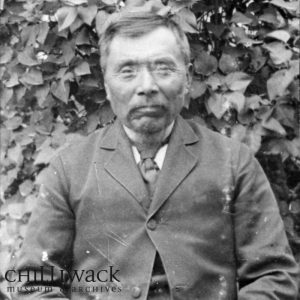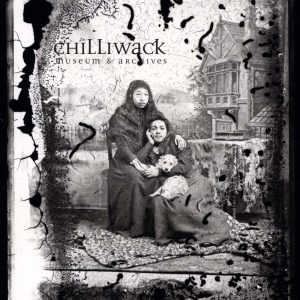We all know the conference stereotype. You sit through a boring lecture pretending to listen while you patiently wait to cash in those conference drinks at the hotel bar. To be fair, most of us have been to such a conference wondering if this was really the best use of our time. We forgive these occasional sleepy conferences for the ones that stand out. As a relatively new professional working for a small institution, conferences are a powerful tool.

Captain John Swalis of Soowahlie First Nation, unknown date [AM 362, File 263(D)]
Conferences allow me to connect with other regional archivists and confirm that I’m keeping up with up-to-date standards. This is when I have the opportunity to bounce ideas around, learn from bigger and smaller (yes, there are smaller institutions) archives, and learn about new resources and recommendations. Occasionally, I’m lucky enough to attend a conference that really stands out above the rest. Like my favourite podcast, The Secret Life of Canada, sometimes you have to give an occasional shout-out to something or someone extra special. I’ll use this platform today to shout-out to the 2019 Canadian-American Archives Conference hosted by the Western Washington University Archives and Records Management Program.
This year’s conference theme was Indigenous Issues in the Archives: Representation and Reconciliation. The conference began with Juanita Jefferson, a Lummi elder. Juanita began by discussing the challenges she faced gathering information from other archives about her community. Then we learned about how her and her community have worked to create their own archives. It was a very inspiring presentation and left me with some wonderful ideas on how to improve relations with our institution and the communities that we serve around Chilliwack.

A portrait of two First Nations girls holding a Salish Woolly dog. Photograph was taken by James O. Booen, Chilliwack, BC’s first professional photographer (c. 1895-1897). [P. Coll 120, P25]
Before we broke for lunch, I learned the different perspectives and challenges with indigenous records from the Canadian side and American side. Camille Callison, a member of the Tahltan Nation in Northern BC, examined her experience with the Truth and Reconciliation Commission of Canada (TRC). Importantly, she went on to show examples of specific recommendations that archives and libraries can act on in response to the TRC’s Final Report and Calls to Action. Her presentation was followed by Jennifer O’ Neal, an archivist and historian with the University of Oregon and a member of the Confederated Tribes of Grand Ronde, discussing the development of the Society of American Archivists’ adoption of the Protocols for Native American Archival Materials. Importantly, both Camille Callison and Jennifer O’Neal explained various traditional indigenous knowledge systems and possible ways to incorporate these systems into archival descriptions and learning for indigenous researchers. The experience was incredibly eye opening and left me with pages of notes and ideas to take back to this institution.
The conference concluded with two non-indigenous archivists, Richard Pearce-Moses and Randall C. Jimerson, and their experience working with indigenous records and researchers. I learned the challenges they faced from other archivists trying to implement simple steps in an attempt to decolonize how we keep and classify indigenous records in a system that was created out of Western European ideology.
In short, some conferences really do make a difference. I’m very thankful that I work for a board and director that sees the advantages of professional development and continues to support our staff in this capacity. I hope to continue to broaden my perspective and implement changes on how we approach indigenous archival material here at the Chilliwack Museum and Archives. Some steps are simple, some will require years of consultation and challenging changes. This conference was a great learning opportunity and I’ll use this platform to give a final shout-out to the Western Washington Archives and Records Management program for hosting an incredible event.

Comments are closed.